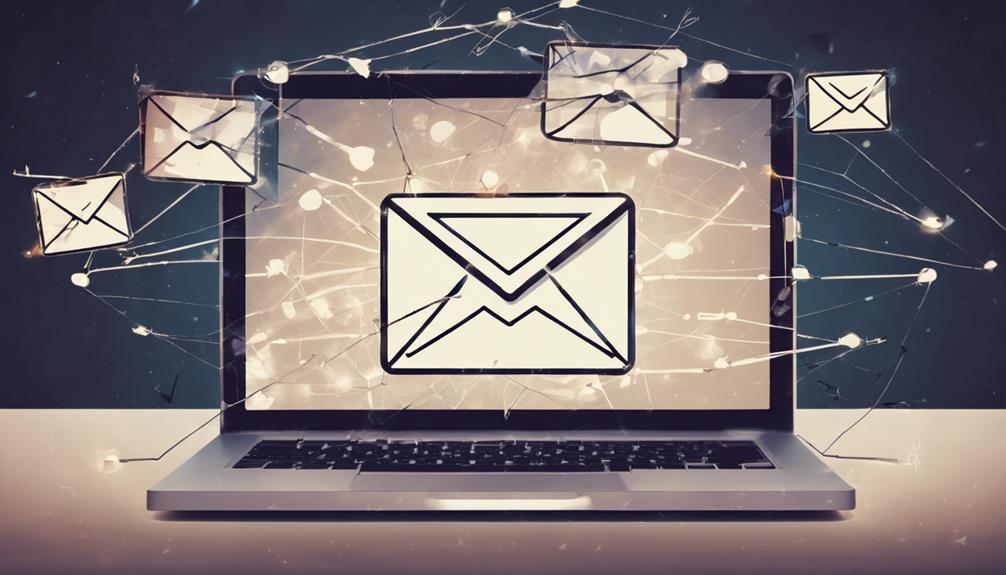Email Marketing Campaigns for Referral Programs
You're likely no stranger to the power of email marketing, but have you considered how it can supercharge your referral program? By leveraging email campaigns, you can encourage subscribers to share your brand with their networks, driving customer engagement and conversions. But what makes an effective email marketing campaign for referrals? Is it the content, the targeting, or something else entirely? As you explore the world of email marketing for referrals, you'll discover that the key to success lies in a combination of these factors – and understanding how to optimize them is vital to revealing your program's full potential.
Key Takeaways
- Analyze your customer base to identify enthusiastic customers who can be referral sources.
- Incentivize subscribers with rewards or discounts in exchange for referrals.
- Craft compelling email content that motivates subscribers to share the brand with their networks.
- Segment and target your email list to boost the effectiveness of referral program campaigns.
Building a Referral Email List
To build a referral email list, you'll need to identify and capture the contact information of customers, partners, and advocates who are likely to participate in your referral program and share your brand with their networks. This requires a strategic approach to sourcing referral leads.
Start by analyzing your existing customer base, identifying satisfied customers who've shown enthusiasm for your brand. You can also leverage social media, online reviews, and customer testimonials to find potential referral sources.
Incentivizing subscribers is vital to encourage them to participate in your referral program. Offer rewards, discounts, or exclusive access to new products or services in exchange for referrals.
Make sure to clearly communicate the benefits of participating in your referral program and provide easy-to-use referral links or codes. By offering incentives, you'll motivate subscribers to share your brand with their networks, increasing the chances of converting referrals into new customers.
Effective referral email list building requires ongoing effort and optimization, so continuously monitor and refine your strategy to achieve the best results.
Crafting Compelling Email Content
When crafting compelling email content for your referral program, you'll want to focus on creating a clear, concise, and engaging narrative that motivates subscribers to take action and share your brand with their networks. Effective email storytelling is key to capturing attention and driving referrals.
Use a conversational tone and personalize your emails to build trust and rapport with your subscribers.
Clearly communicate the benefits of your referral program, including any referral incentives you're offering. Make sure to highlight the value proposition of your brand and the rewards that subscribers can earn by referring friends and family. Use social proof, such as customer testimonials and success stories, to demonstrate the effectiveness of your program.
Use a clear and prominent call-to-action (CTA) to encourage subscribers to share your brand with their networks. Make it easy for them to refer others by including a simple referral link or a pre-populated email template.
Segmenting and Targeting Emails
By regularly segmenting your email list and targeting specific groups with tailored content, you can substantially boost the effectiveness of your referral program's email marketing campaigns.
This approach enables you to deliver relevant and personalized messages that resonate with each segment, increasing the likelihood of engagement and conversion. To achieve this, you'll need to categorize your email list based on demographics, behavior, or preferences.
For instance, you can segment your list into groups such as 'new customers,' 'inactive customers,' or 'loyal advocates.'
Once you've segmented your list, you can create targeted email campaigns that speak directly to each group's interests and needs.
Email personalization is key here, as it allows you to address each recipient by name and tailor the content to their specific preferences. Dynamic content can also be used to further personalize the email experience, by displaying different content blocks or offers based on the recipient's behavior or demographics.
By combining segmentation and targeting with email personalization and dynamic content, you can create highly effective email marketing campaigns that drive real results for your referral program.
This strategic approach will help you maximize your email marketing ROI and achieve your program's goals.
Measuring Campaign Success Metrics
Your email marketing campaigns' effectiveness hinges on tracking the right success metrics, which will enable you to refine your referral program's strategy and optimize its performance.
To measure campaign success, you'll want to focus on metrics that indicate customer engagement, such as open rates, click-through rates (CTRs), and conversion rates. These metrics will help you understand how well your emails are resonating with your audience and driving desired actions.
A/B testing is also vital in measuring campaign success. By testing different subject lines, email copy, and calls-to-action (CTAs), you can determine which elements are most effective in driving customer engagement and conversions.
Additionally, tracking metrics such as unsubscribe rates and complaint rates will help you identify areas for improvement and guarantee that your emails aren't only effective but also respectful of your customers' time and preferences.
Optimizing Email Campaign Performance
Several tweaks can substantially boost your email campaign performance, including personalizing email content based on customer behavior, tailoring subject lines to specific segments, and fine-tuning CTAs to reduce friction.
By implementing these strategies, you can increase engagement, drive conversions, and ultimately, boost referrals. To take it to the next level, consider leveraging email automation to streamline your campaigns.
This can include setting up triggered emails based on customer actions, such as welcome emails or abandoned cart reminders.
Another key area to focus on is subject line testing. By testing different subject lines, you can identify what resonates with your audience and optimize your campaigns for better open rates.
Use A/B testing to compare different subject lines, and analyze the results to inform your future campaigns.
Additionally, consider segmenting your email list to guarantee that the right message is getting to the right person at the right time.
Frequently Asked Questions
Can I Use Purchased Email Lists for Referral Programs?
You're considering using purchased email lists, but beware of pitfalls like low engagement and spam complaints. Validate your referral list by verifying consent and ensuring subscribers are genuinely interested in your program to avoid these issues.
How Often Should I Send Referral Program Emails?
When deciding how often to send emails, you'll want to ponder the ideal frequency to avoid overwhelming subscribers. Timing considerations, such as sending emails during peak engagement hours, can also boost open rates and conversions.
Are Referral Program Emails Subject to Anti-Spam Laws?
You must guarantee your emails comply with anti-spam laws, following GDPR Compliance and CAN-SPAM Guidance. This means clearly stating the sender's identity, providing unsubscribe links, and obtaining explicit consent from recipients before sending emails.
Can I Incentivize Referrals With Exclusive Discounts?
When structuring a referral program, you're allowed to incentivize referrals with exclusive discounts. You're using this strategy to create strong referral motivation and offer loyalty rewards to those who drive sales, but transparency is key.
Should I Use a Dedicated Referral Program Email Domain?
"You'll improve Domain Reputation and Email Deliverability by using a dedicated referral program email domain, as it allows you to isolate reputation signals and better control deliverability, making your referral emails more likely to hit inboxes."
Conclusion
You've now got the tools to create effective email marketing campaigns for your referral program.
By building a targeted list, crafting compelling content, segmenting and targeting emails, and measuring key metrics, you'll drive customer engagement and conversions.
Continuously optimize your campaigns to refine your strategy and boost performance.
With these tactics, you'll be well on your way to leveraging email marketing to fuel the growth of your referral program.







